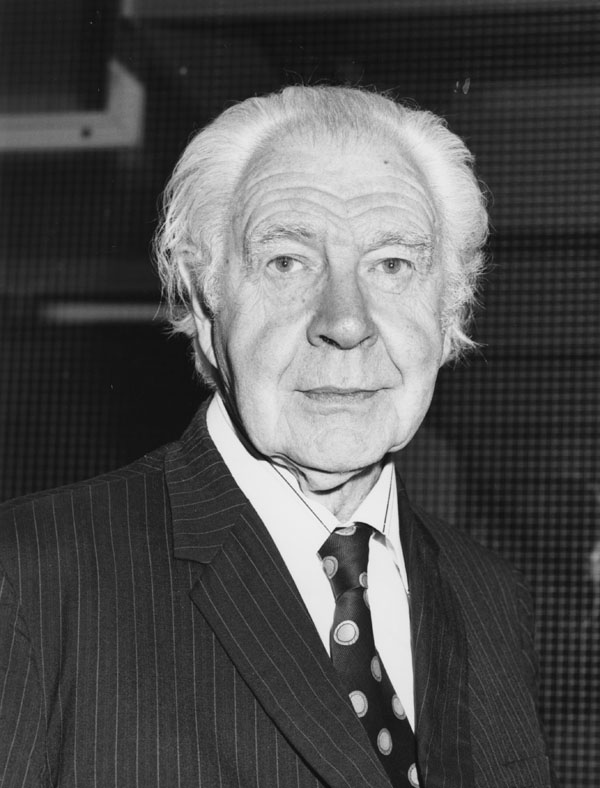Vous pouvez contribuer simplement à Wikibéral. Pour cela, demandez un compte à adminwiki@liberaux.org. N'hésitez pas !
Lionel Robbins
| Lionel Robbins | |||||
| économiste | |||||
|---|---|---|---|---|---|
| Dates | |||||

| |||||
| Tendance | école autrichienne | ||||
| Nationalité | |||||
| Articles internes | Autres articles sur Lionel Robbins | ||||
| Citation | « Le choix n'est pas entre un plan ou une absence de plan, mais entre différents types de plan » | ||||
| Interwikis sur Lionel Robbins | |||||
Lionel C. Robbins était professeur d'économie à la London School of Economics. Connaissant bien la langue allemande, il a pu prendre connaissance très vite des travaux de l'école autrichienne d'économie (Ludwig von Mises, Friedrich Hayek). Intéressé par l'approche de Friedrich Hayek alors qu'il assistait à une conférence à Vienne, Lionel Robbins invite ce dernier à présenter ses travaux à la London School of Economics. Si aujourd'hui, l'école autrichienne est de plus en plus enseigné dans le monde c'est un peu grâce à l'intervention de Lionel Robbins, même s'il n'a jamais adopté pleinement les outils méthodologiques de cette école.
Publications
- 1926, "Dynamics of Capitalism", Economica
- 1927, The Optimum Theory of Population, In: Gregory and Dalton, dir., London Essays in Economics
- "The Representative Firm", 1928, EJ.
- "On a Certain Ambiguity in the Conception of Stationary Equilibrium", 1930, EJ.
- 1932 : An Essay on the Nature and Significance of Economic Science, ['Essai sur la nature et la signification de la science économique]
- 1934,
- a. Remarks on the Relationship between Economics and Psychology, Manchester School
- b. Remarks on Some Aspects of the Theory of Costs, EJ
- c. The Great Depression. London: The MacMillan Co.
- 1936, The Place of Jevons in the History of Economic Thought, Manchester School
- 1938,
- a. Live and Dead Issues in the Methodology of Economicsll, Economica, N.S., 5, 342-52
- b. Interpersonal Comparisons of Utility: A Comment, EJ
- 1939, The Economic Causes of War
- Nouvelle édition en 1968, New York: Howard Fertig
- 1952, The Theory of Economic Policy in English Classical Political Economy, London: Macmillan
- 1955, The Teaching of Economics in Schools and Universities, The Economic Journal, Vol LXV, pp579–593
- 1956, The Economist in the Twentieth Century, In: The Economist in the Twentieth Century and Other Lectures in Political Economy, London: Mac Millan, pp1–17
- 1958, Robert Torrens and the Evolution of Classical Economics
- 1961,
- a. Hayek on Liberty, Economica, 28, February, pp66-81
- Repris en 1999, In: The Legacy of Friedrich von Hayek, Peter J. Boettke, Dir., Aldershot, UK: Edward Elgar Publishing, pp290-305
- b. The Theory of Economic Policy in English Classical Political Economy, London: Macmillan
- a. Hayek on Liberty, Economica, 28, February, pp66-81
- 1963, Politics and Economics
- 1966, The University in the Modern World, 1966
- 1968, The Theory of Economic Development in the History of Economic Thought, 1968.
- 1970,
- a. Jacob Viner: A tribute
- b. The Evolution of Modern Economic Theory
- 1971, Autobiography of an Economist, Macmillan.
- Political Economy, Past and Present, 1976.
- Against Inflation, 1979.
- 1980, Higher Education Revisited
- 1981, Economics and Political Economy, The American Economic Review, Vol. 71, n°2, pp1-10
Citations
- « Le choix n'est pas entre un plan ou une absence de plan, mais entre différents types de plan »
- L’économie est « la science qui étudie le comportement humain en tant que relation entre les fins et les moyens rares à usages alternatifs » et qui est proclamée « absolument neutre vis-à-vis des fins » que celles-ci soient « nobles ou viles. »
Pour aller plus loin
Littérature secondaire
- 1992, Mark Addleson, Robbins’ Essay in Retrospect: On Subjectivism and an ‘Economics of Choice’, In: Mark Blaug, dir., Pioneers in Economics, Vol 40, Aldershot: Edward Elgar, pp507–522
- 2003, Roberto Marchionatti, On the Methodological Foundation of Modern Microeconomics: Frank Knight and the "Cost Controversy" in the 1920s,
History of Political Economy, Volume 35, Number 1, Spring, pp49-75
Articles connexes
Liens externes
| Accédez d'un seul coup d’œil au portail des grands auteurs et penseurs du libéralisme. |
| Accédez d'un seul coup d’œil au portail économie. |